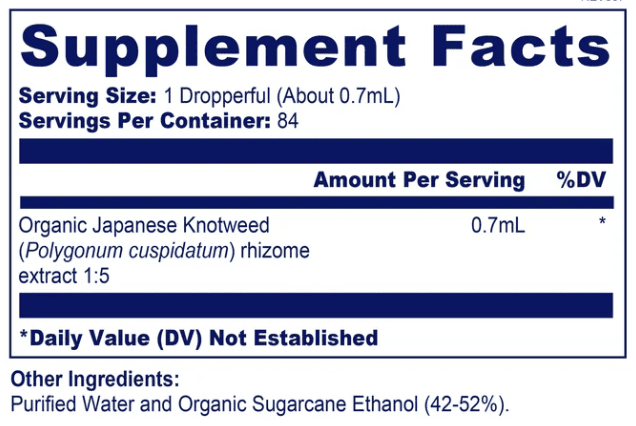Japanese Knot Weed (Organic) – 2 fluid oz.
CAD$104.85 Import fees, brokerage, duties incl.
Tincture concentrates resveratrol for antioxidant & immune system support.
Polygonum cuspidatum, also known as Japanese Knotweed, or by the Mandarin Chinese name of Hu Zhang, is native to Asia, and is a robust perennial in the Buckwheat family. It tends to grow in thickets, has upright racemes of creamy white flowers, large oval to heart-shaped leaves, and chunky, hollow, stems that resemble bamboo. It is sometimes sold under the alternative names of Fallopia japonica or Reynoutria japonica.
In traditional Chinese medicine, Japanese Knotweed is described as bitter and slightly cold, and its uses include supporting the body’s natural detoxification pathways, increasing blood circulation, clearing heat, for various skin concerns, menstruation support, improving liver and cardiovascular health, and as a diuretic.*
Japanese Knotweed extract has demonstrated comprehensive effects on reducing oxidative stress through several complex mechanisms.* The plant contains three main classes of bioactive chemicals; anthroquinones, flavonoids, and stilbenes. The stilbene, Resveratrol, is perhaps the most well-known compound found in Knotweed and is responsible for most of the health benefits associated with this plant. Although Resveratrol gained most of its notoriety after being identified in grape skins and red wine, other sources include blueberries, cranberries, peanuts, pistachios, and soy. Most commercial production of resveratrol for nutritional supplements and scientific experimentation is extracted from the dried roots of Polygonum cuspidatum. Resveratrol has been shown to be a powerful antioxidant. Its beneficial health effects support the cardiovascular and nervous systems, as well as blood sugar, weight and aging processes.* Resveratrol has also demonstrated a protective effect for the kidneys.*
Some of the lesser known bioactive constituents of Knotweed include the anthroquinones, emodin and citreorosein. Another stilbene in Knotweed, known as polydatin, has shown many promising aspects including neurological support for the brain and heart, contribution to cardiovascular health by improving the serum lipid profile, and protection of mice livers from CCl4-induced injury.*
Although Japanese Knotweed has significant health-promoting properties, it is also considered one of the world’s most invasive plants.* It vigorously spreads along roadsides, streambanks, and areas disturbed by development. It creates extensive root systems and easily smothers and crowds out other species. In many areas of the United States, it is listed as a “Noxious Weed” requiring strict control. For this reason, BioPure highly recommends that people wanting to utilize the plants healthful benefits obtain extracts from plants grown under controlled conditions, such as ours. Other products carried by BioPure that contain Polygonum cuspidatum are Quintessence and BioPure’s Cocktail.
*These statements have not been evaluated by the Food and Drug Administration. This product is not intended to diagnose, treat, cure or prevent any disease.
Health Functions
- Immune support*
- Cardiovascular support*
- Energy and vitality support*
- Antioxidant process support*
Suggested Use
- Intended for internal or external use†.
Servings per Container
- 60 (one squeeze of the dropper or about 20 drops)
Ingredients
- Polygonum Cuspidatum (hu zhang, bushy knotweed, giant knot, tiger’s cane) and organic corn alcohol (55% mix).
We obtain raw ingredients and materials from ethical and reliable suppliers worldwide. We use organic, gluten-free alcohol made from corn produced without the use of bioengineering, and we use state-of-the art USP purified water systems for all dilution involving water.







